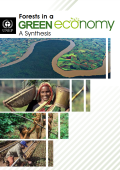This report, by UNEP and INTERPOL, focuses on illegal logging and its impacts on the lives and livelihoods of often some of the poorest people in the world set aside the environmental damage. It underlines how criminals are combining old fashioned methods such as bribes with high tech methods such as computer hacking of government web sites to obtain transportation and other permits. The report spotlights the increasingly sophisticated tactics being deployed to launder illegal logs through a web of palm oil plantations, road networks and saw mills.
The montane forests of Kenya, better known as Kenya’s “Water Towers”, produce direct economic value for its citizens. This value accrues not only from the production of various timber- and non-timber forest products, but also from a range of regulating ecosystem services that provide an insurance value to several key economic sectors. There is also a secondary or indirect multiplier effect associated with the direct economic value of the Water Towers.
This report estimates these economic values, by means of best international analytical practices and environmental and economic evidence from Kenya, and shows that montane forests have consistently been undervalued in conventional national accounting. The findings underline the need for better management, increased investment in montane forests and innovative policy instruments (such as Reducing Emissions from Deforestation and forest Degradation (REDD+)).

Drawing on UNEP’s Green Economy Report, this UNEP brief provides an evidence‐based roadmap for policy makers, the private sector, forest sector and forest dwellers alike. The paper includes an overview of the role of forests in the green economy, policy recommendations for forests in a green economy, and a number of success stories.
The paper concludes that to fully realise the benefits of forests in a green economy, governments and the international community will need to take an active role, including through policy reforms to create incentives to maintain and invest in forests and introduce disincentives to modify market signals and associated rent‐seeking behavior. Examples of policies include national regulations, smart subsidies and incentives, information management, supportive international markets, legal infrastructure, and conducive trade and aid protocols.
The publication presents the results of an evaluation that aimed to seek lessons and recommendations in relation to the low‐carbon development of the World Bank Group’s portfolio in energy, forestry and transport. The evaluation sought to establish how the WBG’s investments in low‐carbon growth opportunities can have the greatest impact, both for development and for greenhouse gas mitigation.
The three key findings emerging from the evaluation are that:
(1) The WBG can achieve great impact by providing advice and support for favourable policies such as removal of energy subsidies and other biases against renewables and energy efficiency,
(2) Act more like a venture capitalist, by supporting the transfer and adaptation to local conditions of existing technologies, policies and financial practices, and
(3) By focusing on high‐impact sectors and instruments, such as energy‐efficiency and forestry interventions.
The world is at a juncture where future financing for forests and REDD+ seems uncertain, and there is a clear risk of a narrative of disappointment setting in. These pressures demand a redoubling of international efforts.
In light of the new challenges and the lessons learned, this paper suggests several pathways to be considered for the next phase of financing of efforts to protect forests, and to enable forest countries to adopt alternative development pathways in which deforestation is reduced. These pathways include the need to:
